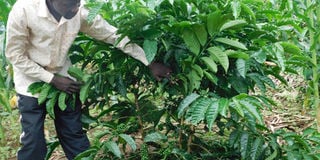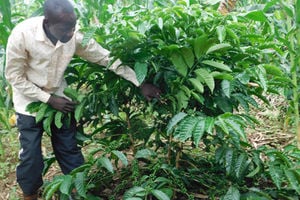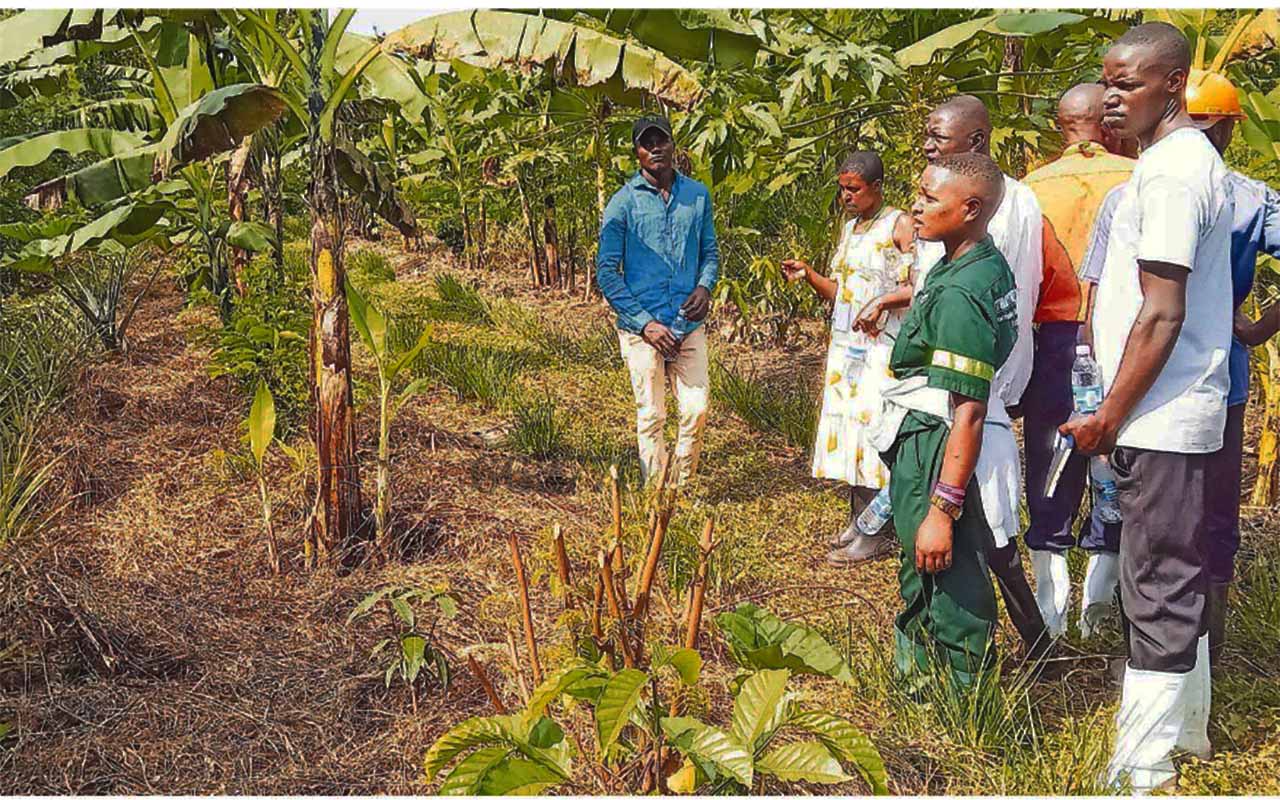
A farmer takes a look at one of the young coffee trees. PHOTO/nmg
The aroma of good coffee filled the air last Saturday as Seeds of Gold held its farm clinic at BugiZardi in Bulambuli District.
A few minutes to 8am, the farmers mainly drawn from the coffee growing areas of Mt Elgon started to flock to the institution of higher education armed with notebooks and pens ready to interact with agriculture experts.
At about 10.30 am, the event started. The farmers began with a four-hour question and answer session before they later toured a coffee farm for lessons on best growing practices as well processing and marketing.
Dr Nasser Kasozi, the director of research for the BugiZardi a Naro zonal agricultural research and development institute, advised farmers to always test their soils and check the soil moisture content as monitoring provides vital information that may be used to improve crop quality and yields.
“The soil pH is a crucial indicator of the biological and chemical health of the soil, with adjustments such as adding lime to soil potentially restoring a balanced pH and enabling the crop to flourish. The acidity of the soil in a coffee farm should range from 4.9 to 5.6 to fully support a plant,” he explained.
Currently, farmers are grappling with pests and diseases that has led to decline in the production and quality of coffee berries.
Crop defoliation
With the lack of rain, soils have become dry leading to defoliation of the crop quality and berry abortion.
According to Dr Sauma Nyakahuma, to cushion farmers from such climate change effects, intercropping coffee plants with trees such as grevillea and moringa helps provide shade to the crops ensuring longevity.
“This also helps to maintain the quality of coffee and improve its flavour despite the harsh weather conditions,” she said.
Apart from shading, farmers were also advised to spray foliar fertiliser on their crops as a short-term measure in the dry season to ensure flowering.
The use of irrigation and mulching was identified as the other ways to mitigate climate change effects.
Mulching
Dr Nyakahuma said mulching provides nutrients and ensures that soil contains enough moisture.
The researcher at the institution also explained to farmers why they should choose varieties to grow wisely as the genetic make-up of a plant affects its susceptibility.
She noted that some varieties are more vulnerable to diseases, for instance, SL, to leaf rust.
Other common causes of diseases include environmental conditions with diseases such as coffee berry manifesting during the rainy seasons.
Improper crop management and intercropping coffee with plants that are primary hosts to pests also affect production.
Control
To curb leaf rust, Dr Nyakahuma called for use of organic copper or any fungicide while for coffee berry disease, which is one of the biggest challenges affecting the region, she recommended growing resistant varieties.
However, some farmers raised concerns that they have been planting new varieties but have largely been affected by diseases.
Joseph Wameli, a farmer from Mbale, said he bought coffee seedlings from a roadside nursery in Mbale City about four years ago, but the crop has since been affected by the berry disease.
Dr Nyakahuma, however, faulted the farmer for purchasing poorly grafted coffee seedlings, noting that for many, the scion is wrongly placed.
She asked farmers to buy quality seedlings from certified coffee nursery developers or at the institute.
“Usually, one cannot tell the variety of plants bought from unlicensed dealers even at five years. Thus, it becomes difficult to know what diseases or climatic conditions it is susceptible to,” she said.
Initially, Dr Nyakahuma said some pests that were only found in the lowland areas did not affect crops grown in the highlands but with climate change, coffee farmers are facing the same challenges.
Olivier Nandutu, a farmer from Sironko District, said the clinic, whose theme was the “Road to quality coffee, regaining the footing”, was timely.
“I will use the knowledge gained here to invest in value addition so that I process produce from my 10 acres. I plan to start processing my coffee beans by naturally fermenting or pulping them using honey to create diverse products for the market,” She said.
Seeds of Gold magazine editor Charles Tabu Ayiasi asked locals to embrace such training, noting that the knowledge received would play an important role in improving livelihoods.
Training
Apart from shading, farmers were also advised to spray foliar fertiliser on their crops as a short-term measure in the dry season to ensure flowering.








